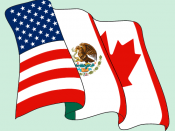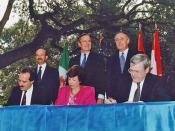How do international sanctions, tariffs, quotas, and trade restrictions affect international trade and costs of production?International sanctions are set in place typically to protect countries involved in trade. There are many types of sanctions that have been in place for quite a while but the most common sanctions are used to stop terrorism, which is extremely important to even more so since September 11, 2001. Sanctions regarding trade restrictions on weapons, ammunition, and other materials used to make weapons or explosives are common among countries. When it comes to tariffs, it is a tax on imports imposed by the government to raise funds. There are also many types of tariffs, which are used by nearly every government in the world to exploit more money revenue for that government. In many cases a tariff is in place to protect an industry in that country. A Quota is a way to describe the checks and balance system for which a government or business determines its supply and demand quantity.
Different international sanctions, tariffs, quotas, and trade restrictions all can hamper international trade and may also increases the cost of production.
How do tariffs and sanctions on the import of auto engines into the U.S. affect production and costs at Acme?Tariffs and sanctions ultimately would hinder Acme Motors on the import of auto engines and parts because the price of the production pieces would rise noticeably. At this current time United States benefits extremely from the North American Free Trade Agreement (NAFTA), since the U.S. does not impose tariffs and hampering sanctions on trades with Canada and Mexico. As explained in the first paragraph, that if tariffs were implemented the prices of these products would greatly increase because of the government take on this revenue which would lead to higher prices the consumers...


